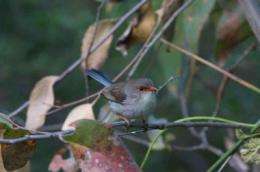Fairy-wren babies need password for food

It's always a good idea to listen to your mother, but that goes double for baby fairy-wrens even before they are hatched.
If those fairy-wren babies want to be fed, they need to have a password—a single unique note—taught to them by their mothers from outside the egg. The nestlings incorporate that password right into their begging calls, according to researchers who report their discovery online on November 8 in Current Biology.
This remarkable example of prenatal learning is an adaptation that apparently allows fairy-wren parents to discriminate between their own babies and those of parasitic cuckoos who have invaded their nests. Females also teach their mate and any helpers the password by singing it to them in a "solicitation song" performed away from the nest.
"Parents and others attending the nestlings will only feed them if their begging calls contain the learned password," said Sonia Kleindorfer of Flinders University in Australia. Otherwise, the parents simply abandon the nest and start again.
Kleindorfer and her colleagues originally stumbled onto this scheme when they noticed something unexpectedly odd while studying nest predators and alarm calls: superb fairy-wren mothers calling to their unhatched eggs. The researchers later found that fairy-wren nestlings' one-note begging calls differed from one nest to another. The researchers' key breakthrough was the realization that the unique element in each female's incubation call was the basis of the begging call of her brood. In other words, it was a password.
Cross-fostering experiments, in which clutches of eggs were swapped between nests, showed that the nestlings produced begging calls that matched their foster mothers, not their biological mothers, evidence that the passwords were indeed learned. The researchers found they could also prevent attending parents from feeding their nestlings by placing a loudspeaker under the nest that played the wrong begging call.
The findings show that even traits that appear innate may actually be learned. Such an ability could have real evolutionary implications for the superb fairy-wrens, and more broadly.
"We show that females that guard and teach the embryo could increase the transmission efficacy of female cultural traits," Kleindorfer explained. "In systems with uniparental care, caretakers of embryos will have more opportunity to pass on female memes, or 'messages,' to the embryo." And, she added, that means that mothers have a special ability to transmit not just genes to the next generation, but also memes.
More information: Colombelli-Negrel et al.: "Embryonic learning of vocal passwords in superb fairy-wrens reveals intruder cuckoo nestlings." DOI: 10.1016/j.cub.2012.09.025
Journal information: Current Biology
Provided by Cell Press





















